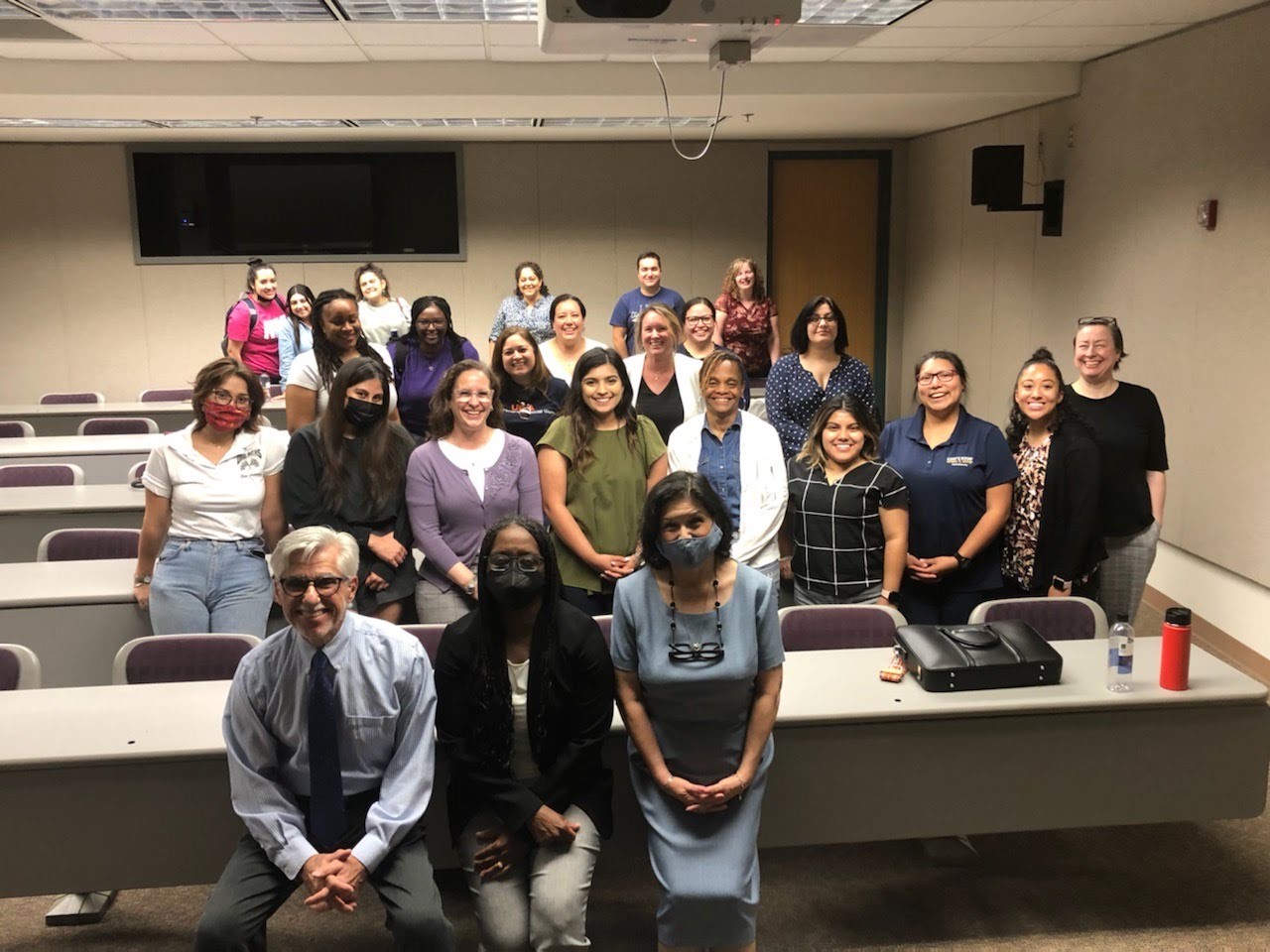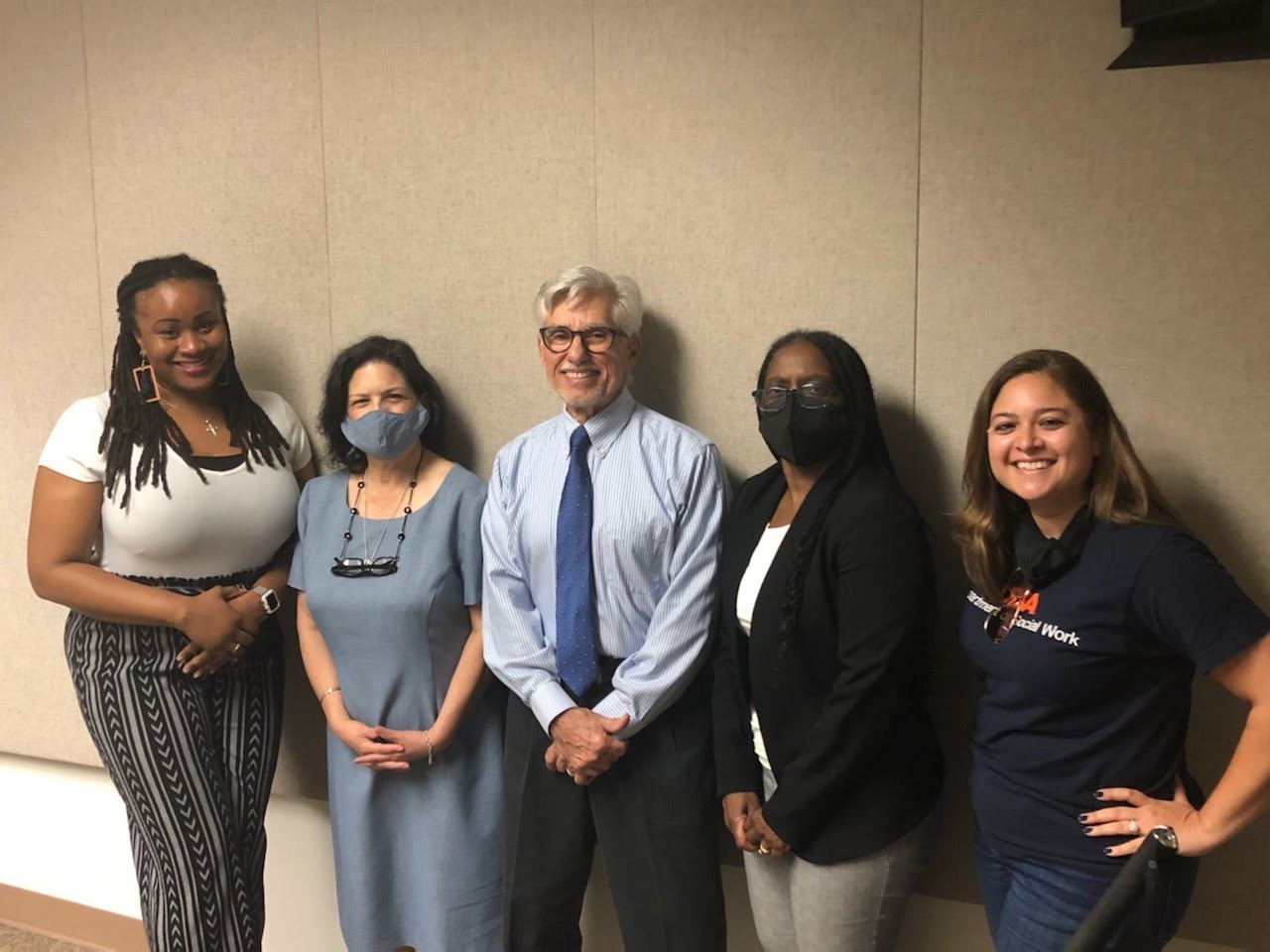Posted on May 30, 2022 by Amanda Cerreto
MAY 31, 2022 - Thanks to a grant from UTSA's Academic Innovation , the Department of Social Work in the College for Health, Community and Policy (HCAP) brought innovative technology into the classroom.
The Multidisciplinary Field Education Professional Simulation (FEPS) Initiative enabled students in social work, counseling and criminology and criminal justice to get a real-life feel for the entire process of a child abuse case, from reporting to trial, using social simulations via the Social Work Special Topics: Child Welfare Course.
Simulations are realistic scenarios interpreted by actors to simulate experiences relevant to working in child welfare. These simulations provide a safe environment to practice and enhance skills vital to a successful child welfare career.
 The idea of a simulation program began during the height of the COVID-19 pandemic, when so many students and workers were forced to isolate. "Social work is a very hands-on field," said
Beatriz Alaniz
, associate professor of practice. "Our program requires a lot of on-site internship hours. With COVID displacing many of our field students, we had to pivot and figure out a way for students to gain meaningful experiences. So, we created the Field Education Professional Simulation (FEPS) program within the Department of Social Work to help students meet those field practicum requirements."
The idea of a simulation program began during the height of the COVID-19 pandemic, when so many students and workers were forced to isolate. "Social work is a very hands-on field," said
Beatriz Alaniz
, associate professor of practice. "Our program requires a lot of on-site internship hours. With COVID displacing many of our field students, we had to pivot and figure out a way for students to gain meaningful experiences. So, we created the Field Education Professional Simulation (FEPS) program within the Department of Social Work to help students meet those field practicum requirements."
With the support of Academic Innovation's project opportunities, FEPS expanded to include students from other fields of study this semester. Participation in the program was voluntary and included both UTSA students and professionals in the field of social work, counseling and law from city agencies. These “community liaisons” volunteered to role play the roles of victims, parents/caregivers, perpetrators, attorneys and a judge.
Utilizing Microsoft Teams and other technology enabled from the grant, students were able to participate in in-depth learning using simulations with standardized child abuse cases. In total, six counseling students and two social work students from the HRSA/PEP grant participated in the program alongside nine Criminal Justice students and 21 Social Work students as the professionals reporting and/or investigating the cases. The simulation interviews culminated in a mock trial as the final project with Social Work students being cross-examined by the “legal community liaisons” during the Child Welfare class.
The simulation work was also incorporated into the classwork, thanks to Title IV-E Director and Professor, Sydney Knowles . To help students prepare for their simulated client interviews, they were required to research best practices in forensic interviewing children and families exposed to child abuse.
 Students completed interviews with the community liaisons who portrayed the victim child, victim child's caregiver, alleged perpetrator, and any other collateral contacts the students felt necessary to interview during their investigation. They also had access to a “supervisor,” who was responsible for staffing their cases with them, just as caseworkers do for guidance and protocol in the real working environment.
Students completed interviews with the community liaisons who portrayed the victim child, victim child's caregiver, alleged perpetrator, and any other collateral contacts the students felt necessary to interview during their investigation. They also had access to a “supervisor,” who was responsible for staffing their cases with them, just as caseworkers do for guidance and protocol in the real working environment.
“Initially, students were worried about how well they would perform at the end of the project when they needed to take the stand and testify on the findings of their interviews,” said Knowles. “They all did great, especially since this was a first-time experience for most of them.”
The participating students were required to join forces as a multidisciplinary team in preparation for their trial testimonies and a joint effort Pre-Court Report, which included all details gathered from students' individual interviews. This pre-court report also allowed the students to make recommendations to the court for family services in the best interest of the family. They also met with the acting district attorney, Mary Valdez , Esq, as a multidisciplinary team to prepare for court testimony.
On the day of the mock trial, social work students took the stand to testify on their interviews. They were cross examined by an opposing counsel, Brenda Knowles , Esq., and given a final verdict with court ordered services by our guest judge, Judge Richard Garcia , a recently retired Bexar County Children's Court judge. The judge processed his decision-making with the class after each case was dismissed.
“I volunteered to participate in this initiative because I believe that students should be exposed to the real world of social work,” Esq. Knowles said.
As a final component of their project grade, students submitted a trial reflection which allowed them to take a moment to process all the work they did over the semester. “I was very pleased to read the majority of the students found the project impactful, insightful, and a true eye opener about the hard work CPS caseworkers put into protecting and strengthening families,” said Knowles.
While the grant was one-time only, the social work department is already building the cost for this program into next year's budget. “It is really an invaluable experience for so many of our students,” Alaniz said.

